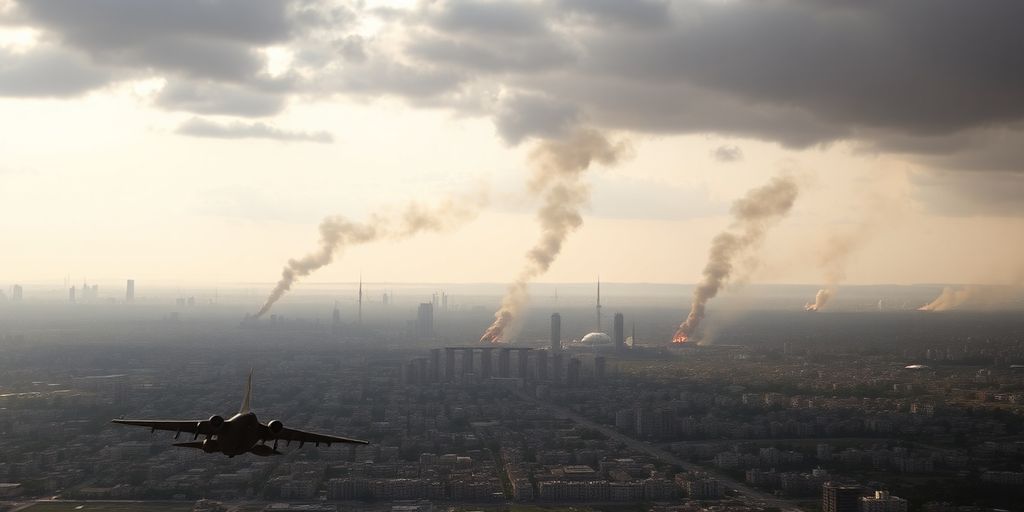Recent Israeli airstrikes in Syria have escalated tensions between Israel and Turkey, as both nations vie for influence in the region following the fall of Bashar al-Assad. The strikes targeted military facilities that Turkey was reportedly considering for its own military presence, signaling a potential showdown between the two powers.
Key Takeaways
- Israel conducted multiple airstrikes on Syrian military bases, including Hama and T4 airfields.
- The strikes are seen as a direct warning to Turkey, which is negotiating a defense pact with Syria’s new government.
- Turkey’s foreign minister expressed concerns over Israel’s actions, labeling them a destabilizing force in the region.
- The situation reflects a broader struggle for control and influence in post-Assad Syria.
Background of the Conflict
The recent airstrikes by Israel mark a significant escalation in its military operations in Syria, which have intensified since the ousting of Assad in December 2024. Israel’s military actions are primarily aimed at preventing Iranian entrenchment and countering any potential threats from a newly empowered Islamist government in Syria.
Turkey, having supported opposition forces against Assad, is now positioning itself to play a major role in Syria’s future. Reports indicate that Turkey was assessing several air bases for potential military deployment, including T4 and Hama, which prompted Israel’s preemptive strikes to thwart any Turkish military establishment in these strategic locations.
Details of the Airstrikes
- Targets: The Israeli Defense Forces (IDF) targeted multiple sites, including:
- Impact: The strikes resulted in significant damage, with reports indicating the near-total destruction of the Hama base and casualties among Syrian military personnel.
- Israeli Justification: Israeli officials have stated that these operations are necessary to ensure the security of Israel and to prevent hostile forces from gaining a foothold in Syria.
Turkey’s Response
In response to the airstrikes, Turkey’s foreign minister, Hakan Fidan, condemned Israel’s actions, asserting that they threaten regional stability and exacerbate tensions. He emphasized Turkey’s desire to avoid confrontation, stating that Syria should determine its own policies without external interference.
Turkey’s government has accused Israel of attempting to establish a "Turkish protectorate" in Syria, reflecting deep-seated fears about Ankara’s growing influence in the region. The Turkish foreign ministry labeled Israel as the greatest threat to regional security, calling for an end to its military operations in Syria.
Implications for Regional Stability
The ongoing conflict between Israel and Turkey over Syria’s future raises significant concerns about regional stability. As both nations pursue their interests, the potential for miscalculation and escalation remains high. Analysts warn that the situation could lead to a broader confrontation, especially if Turkey proceeds with its military plans in Syria.
The dynamics in Syria are further complicated by the presence of various armed groups and the historical sectarian divisions within the country. As external powers like Israel and Turkey continue to assert their influence, the risk of renewed conflict looms large, threatening to destabilize not only Syria but the entire region.
In conclusion, the recent Israeli airstrikes represent a critical juncture in the evolving geopolitical landscape of Syria, highlighting the intricate balance of power and the potential for conflict between two regional heavyweights.
Sources
- Israeli strikes on Syria are threat to Turkey, Turkish foreign minister suggests, Middle East Eye.
- Israeli strikes in Syria a challenge to Turkey, BBC.
- Israel Craters Runway To Keep Turkey From Taking Over Syrian Airfield, The War Zone.
- Israel steps up Syria strikes, says Turkey aims for ‘protectorate’, Reuters.
- Israel hit Syrian bases scoped by Turkey, hinting at regional showdown, sources say, Al Arabiya English.






